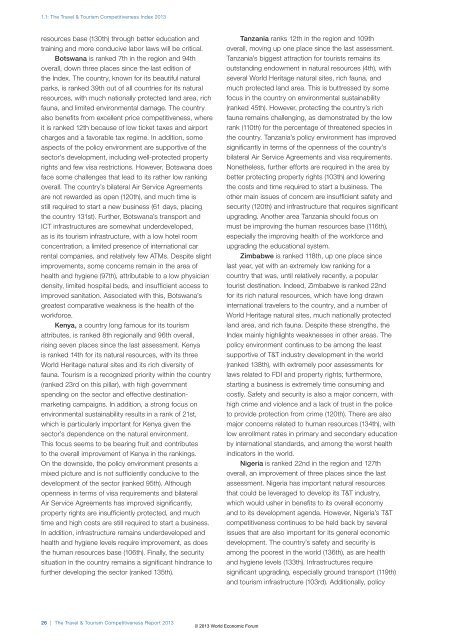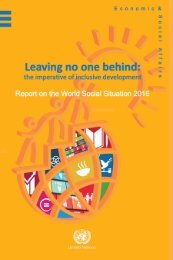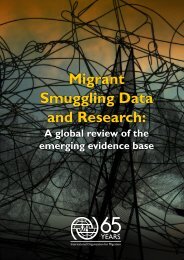The Travel & Tourism Competitiveness Report 2013
The Travel & Tourism Competitiveness Report 2013
The Travel & Tourism Competitiveness Report 2013
Create successful ePaper yourself
Turn your PDF publications into a flip-book with our unique Google optimized e-Paper software.
1.1: <strong>The</strong> <strong>Travel</strong> & <strong>Tourism</strong> <strong>Competitiveness</strong> Index <strong>2013</strong><br />
resources base (130th) through better education and<br />
training and more conducive labor laws will be critical.<br />
Botswana is ranked 7th in the region and 94th<br />
overall, down three places since the last edition of<br />
the Index. <strong>The</strong> country, known for its beautiful natural<br />
parks, is ranked 39th out of all countries for its natural<br />
resources, with much nationally protected land area, rich<br />
fauna, and limited environmental damage. <strong>The</strong> country<br />
also benefits from excellent price competitiveness, where<br />
it is ranked 12th because of low ticket taxes and airport<br />
charges and a favorable tax regime. In addition, some<br />
aspects of the policy environment are supportive of the<br />
sector’s development, including well-protected property<br />
rights and few visa restrictions. However, Botswana does<br />
face some challenges that lead to its rather low ranking<br />
overall. <strong>The</strong> country’s bilateral Air Service Agreements<br />
are not rewarded as open (120th), and much time is<br />
still required to start a new business (61 days, placing<br />
the country 131st). Further, Botswana’s transport and<br />
ICT infrastructures are somewhat underdeveloped,<br />
as is its tourism infrastructure, with a low hotel room<br />
concentration, a limited presence of international car<br />
rental companies, and relatively few ATMs. Despite slight<br />
improvements, some concerns remain in the area of<br />
health and hygiene (97th), attributable to a low physician<br />
density, limited hospital beds, and insufficient access to<br />
improved sanitation. Associated with this, Botswana’s<br />
greatest comparative weakness is the health of the<br />
workforce.<br />
Kenya, a country long famous for its tourism<br />
attributes, is ranked 8th regionally and 96th overall,<br />
rising seven places since the last assessment. Kenya<br />
is ranked 14th for its natural resources, with its three<br />
World Heritage natural sites and its rich diversity of<br />
fauna. <strong>Tourism</strong> is a recognized priority within the country<br />
(ranked 23rd on this pillar), with high government<br />
spending on the sector and effective destinationmarketing<br />
campaigns. In addition, a strong focus on<br />
environmental sustainability results in a rank of 21st,<br />
which is particularly important for Kenya given the<br />
sector’s dependence on the natural environment.<br />
This focus seems to be bearing fruit and contributes<br />
to the overall improvement of Kenya in the rankings.<br />
On the downside, the policy environment presents a<br />
mixed picture and is not sufficiently conducive to the<br />
development of the sector (ranked 95th). Although<br />
openness in terms of visa requirements and bilateral<br />
Air Service Agreements has improved significantly,<br />
property rights are insufficiently protected, and much<br />
time and high costs are still required to start a business.<br />
In addition, infrastructure remains underdeveloped and<br />
health and hygiene levels require improvement, as does<br />
the human resources base (106th). Finally, the security<br />
situation in the country remains a significant hindrance to<br />
further developing the sector (ranked 135th).<br />
26 | <strong>The</strong> <strong>Travel</strong> & <strong>Tourism</strong> <strong>Competitiveness</strong> <strong>Report</strong> <strong>2013</strong><br />
Tanzania ranks 12th in the region and 109th<br />
overall, moving up one place since the last assessment.<br />
Tanzania’s biggest attraction for tourists remains its<br />
outstanding endowment in natural resources (4th), with<br />
several World Heritage natural sites, rich fauna, and<br />
much protected land area. This is buttressed by some<br />
focus in the country on environmental sustainability<br />
(ranked 45th). However, protecting the country’s rich<br />
fauna remains challenging, as demonstrated by the low<br />
rank (110th) for the percentage of threatened species in<br />
the country. Tanzania’s policy environment has improved<br />
significantly in terms of the openness of the country’s<br />
bilateral Air Service Agreements and visa requirements.<br />
Nonetheless, further efforts are required in the area by<br />
better protecting property rights (103th) and lowering<br />
the costs and time required to start a business. <strong>The</strong><br />
other main issues of concern are insufficient safety and<br />
security (120th) and infrastructure that requires significant<br />
upgrading. Another area Tanzania should focus on<br />
must be improving the human resources base (116th),<br />
especially the improving health of the workforce and<br />
upgrading the educational system.<br />
Zimbabwe is ranked 118th, up one place since<br />
last year, yet with an extremely low ranking for a<br />
country that was, until relatively recently, a popular<br />
tourist destination. Indeed, Zimbabwe is ranked 22nd<br />
for its rich natural resources, which have long drawn<br />
international travelers to the country, and a number of<br />
World Heritage natural sites, much nationally protected<br />
land area, and rich fauna. Despite these strengths, the<br />
Index mainly highlights weaknesses in other areas. <strong>The</strong><br />
policy environment continues to be among the least<br />
supportive of T&T industry development in the world<br />
(ranked 138th), with extremely poor assessments for<br />
laws related to FDI and property rights; furthermore,<br />
starting a business is extremely time consuming and<br />
costly. Safety and security is also a major concern, with<br />
high crime and violence and a lack of trust in the police<br />
to provide protection from crime (120th). <strong>The</strong>re are also<br />
major concerns related to human resources (134th), with<br />
low enrollment rates in primary and secondary education<br />
by international standards, and among the worst health<br />
indicators in the world.<br />
Nigeria is ranked 22nd in the region and 127th<br />
overall, an improvement of three places since the last<br />
assessment. Nigeria has important natural resources<br />
that could be leveraged to develop its T&T industry,<br />
which would usher in benefits to its overall economy<br />
and to its development agenda. However, Nigeria’s T&T<br />
competitiveness continues to be held back by several<br />
issues that are also important for its general economic<br />
development. <strong>The</strong> country’s safety and security is<br />
among the poorest in the world (136th), as are health<br />
and hygiene levels (133th). Infrastructures require<br />
significant upgrading, especially ground transport (119th)<br />
and tourism infrastructure (103rd). Additionally, policy<br />
© <strong>2013</strong> World Economic Forum

















